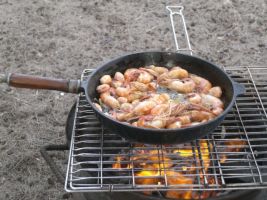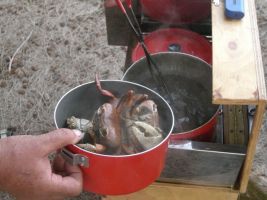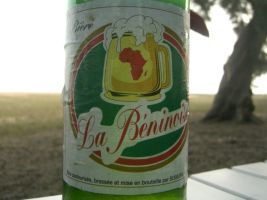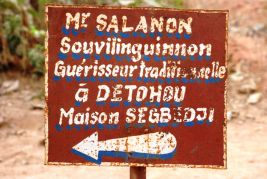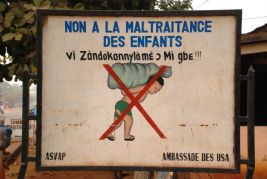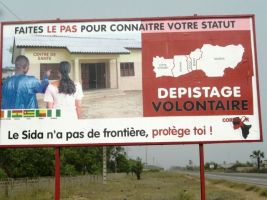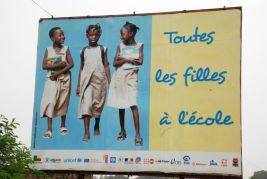
 Italia
Italia France
France Spain
Spain Morocco
Morocco Mauritania
Mauritania Senegal
Senegal Mali
Mali Burkina
Burkina Ghana
Ghana Togo
Togo Benin
Benin Nigeria
Nigeria Cameroon
Cameroon Gabon
Gabon Sao Tomè
Sao Tomè Gabon 2
Gabon 2 Congo
Congo Congo DCR
Congo DCR Angola
Angola Namibia
Namibia Sud Africa
Sud Africa Namibia 2
Namibia 2 Botswana
Botswana Zimbabwe
Zimbabwe Botswana 2
Botswana 2 Sud africa 2
Sud africa 2 Swaziland
Swaziland Mozambico
Mozambico Malawi
Malawi Tanzania
Tanzania Rwanda
Rwanda Uganda
Uganda Kenya
Kenya Etiopia
Etiopia Sudan
Sudan Egitto
Egitto Libia
Libia Tunisia
Tunisia Malta
Malta
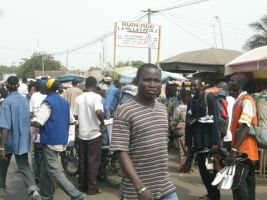
Benin frontier – 19 Feb 2008
The entrance through Hilla-Condji border is quick and without problems. The usual offices: customs and a police department.
We do not have any problems, unlike one traveller who we heard had to pay 2000CFA for a ‘coffee tip’ so he could enter the country.
The atmosphere is chaotic and lively with many street sellers. It is full of the hustle and bustle of people travelling back and forth.
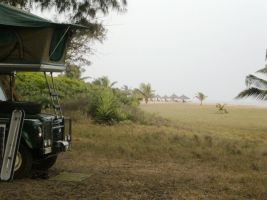
Gran Popo – 19 Feb 2008
The name doesn’t sound much, but the place is delightful. We camp on the beach at the Hotel Gran Popo, 2000 CFA each and it has a small swimming pool. N06 16 745 E01 49 769.
Further on, there is a village with a large deserted beach.
We do some more maintenance work on the car, greasing and oiling joints, hinges and exposed moving parts seized and rusted by the sand… With a little sand paper, elbow grease and some WD, I finally get the ratchet jack to run up and down smoothly; I then fasten and secure it using some wire and gaffer tape
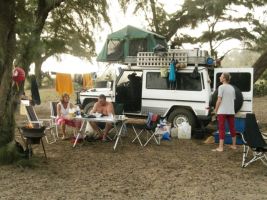
Helmut and Bab
We meet Helmut and Bab, a couple who have been working in Nigeria for over 11 years. Having left Abujia they are heading towards Europe, where they will then travel down the other side of Africa. Maybe we will meet them again in Tanzania. We chat for a while and exchange experiences, ideas and tips.
Increasingly, the experience we hear most from the people we meet, is that money and how to extract it from the traveller has become rudimentary. The traveller and in particular a white traveller, is seen quite simply as fair game.
These rudimentary practices are becoming rife. We were told that there is no fuel. We learn to the contrary that, not only is there fuel, but lots of it. The trouble is, is finding somewhere to buy it, other than on the black market. It is common practice for petrol stations to open up, collect a grant from the State, fill up with petrol and then close down.
This is just one of many examples…
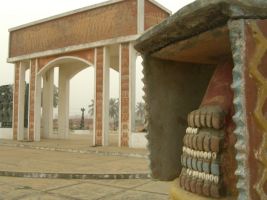
Ouidah – 21 Feb 2008
It is the centre for Benin Voodoo. Whilst we are writing our postcards, we see a procession of semi-naked street dancers who are sprinkling water. People look out from shops and their houses… you get the impression that people rarely smile.
A few kilometres from the beach we visit a monument dedicated to the victims of the slave trade… from here they were sent to Haiti and Brazil.
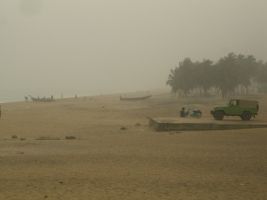
In the meantime, we decide to eat with Helmut and Bab where we share some extremely fresh (like alive!) crabs and shrimps…
We camp on the beach under the palm trees. We could start getting used to this…
We sleep on the Auberge La Diaspora. 3000 CFA a head.
GPS N06°19,533’ E02°05,544’.
The weather is very strange. It is hot and breezy; the heavy mist softens and diffuses the sunlight creating a somniferous, slumberous mood.
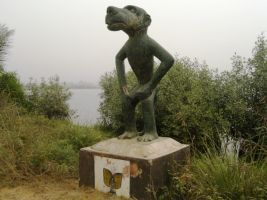
Michelin, where are you? – 22 Feb 2008
Along the roadside of slave road, there are many Voodoo statues which accompany you to the city centre. Driving without incident towards Cotonou - the real capital, is nothing short of a miracle.
It was not our intention to enter the busy and polluted streets, but we are looking for a Michelin tyre.
On the Internet, we had located the only authorized dealer…but we just cannot find them. Of course, every other brand is available.
There is also an Italian contact here, but as with our Michelin dealer, he too has seemingly disappeared into thin air. So, in goes the towel and we head northwards… fingers crossed!
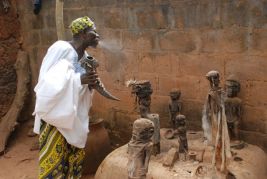
Abomey – 23 Feb. 2008
It is the ancient capital of Dahomev. And, unfortunately, we haven’t the time to visit it properly. We allow ourselves a full morning to visit the master of Voodoo ceremonies and chief of “fetisheur”.
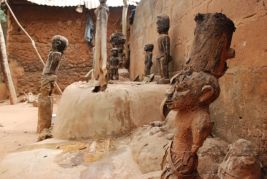
Social life here revolves around the fetish (it is a pity that the word ’fetish’ in English, has become synonymous with its meaning as a form of sexual desire in which gratification is usually outside what is considered to be the norm. It is important to make the distinction, that this is not the meaning in this context. Here, ‘fetish’ is an inanimate object worshipped for its supposed magical powers or because it is considered to be inhabited by a spirit.) It is believed that, these statues and objects have the power over life’s destiny and people’s health. Every object relates to a particular purpose, fertility, travel, family etc… Some wooden statues are quite primitive, but with elegant features. Most date back to more than three centuries ago.
Mark is our guide (tel. 00229-97-80-61-82). He is an experienced guide and recommended by “Chez Monique”, the campsite where we spend the night. 5000CFA for camping, 7500 CFA for a room with a bathroom. GPS N07°11.514’ E001°58.490’
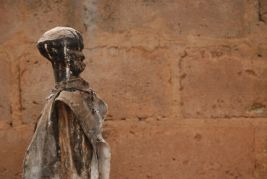
We are now very close to Nigeria. We need to decide which border to go through, avoiding the most dangerous in the South and the extreme in the North where you need a visa, which we do not have. We have been told that there are many borders and some new roads that are not indicated on the maps. Once on Nigerian soil, we need to reach Abujia before nightfall for safety reasons. There are 700km between the border and the capital and we only have 11 hours of light (not counting the hours we will need to go through customs). We need to make the right choice, we could do with some help… maybe we could consult the fetish traveller?...
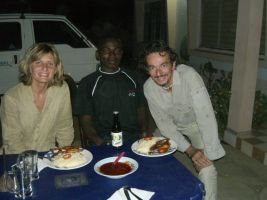
Towards the Northern frontier – 23 Feb 2008
It is 4:00pm and we have already covered the 320km to Ndali. From here, we need to decide whether to drive to Nikki, 100km away on the eastern border, or head towards Kandi, 155km away and then a further 95km before the Segbana border. We do not know any of the road conditions but it is vital we arrive before nightfall. We ask a police officer for more details. We opt for 100km of big potholes; it means we will need to keep our speed down and risk driving the final 50km as night falls. Thankfully, the conditions improve over the final kilometres and we arrive in Kandi at 8:00p.m. We soon find a cheap and clean Motel. Roland prepares the excellent dinner. GPS N11°08.295' E002°56.554'
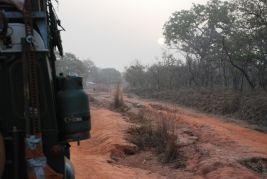
Off we go! – 24 Feb. 2008
We get up at 6:00 a.m. and head towards the Nigerian border. We haven’t a clue what the road conditions will be like. Helmut, the guy we met a few days ago, has lived here for over 10 years and he swears there is a new road that leads to this frontier.
As we make our way, the only living sole is a monkey. How strange, the road is getting narrower, surely, unsuitable for lorries that need to cross the state.
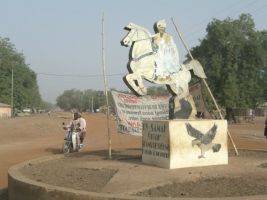
Segbana
We arrive in Segbana and ask for information. We do not get any answers, just very incredulous faces. They probably did not understand us. We get to a school and ask again. This time there is an answer… “There isn’t a border here! We have the Army”… Very well, where is the Army?
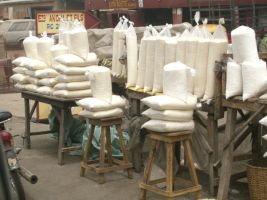
The Army
We head towards the road kindly indicated to us by a passer-by. From a market stall ahead, a man in a yellow fleece (we are wearing a T-shirts) stops us. From behind the car window, we ask who he is. He lifts his fleece revealing his military uniform.
He invites us to the nearby barracks to sort out our documents. After 40 minutes of telephone calls, consultation among colleagues, a chief comes along and we learn that they cannot stamp the Carnet de Passage but only our passports. The nearest customs is in Nikki, where we were yesterday...200km south!
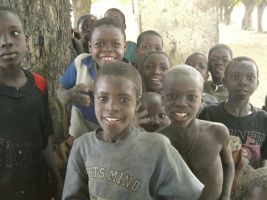
We just cannot believe that we will have to go back. We cannot get to Abuja! All our plans to reach the capital by Sunday to get our Visas for next week suddenly disappear. We have travelled for nothing. The soldiers kindly tell us there is a track we can take, which is just 160km to Nikki…
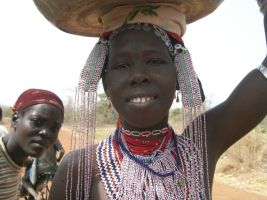
The track seems good and the people we see are very curious. During the three and a half months we have been travelling and in the eight countries we have crossed, we have met all sorts of people. Very experienced travellers; improvising and very experienced guides; white people who have migrated and settled in Africa and black people speaking with a Bergamo accent; laic and Catholic missionaries; volunteer doctors in charitable organizations and others that have loads of will but require plenty charity. However, everyone has something to say about Nigeria and its relative dangers: although, opinions are rarely expressed with any degree of consistency, making it all the more difficult to ascertain a true picture. You hear just snippets and a variety of rumours, from simply “very dangerous” to “policemen who confiscate your documents and ask for money before giving them back to you”, “road blocks every 100m”, “ambushes”, “stones thrown at your vehicle”, “they prostitute their own sisters”, “they spend days with you and then they steal everything they can”, “they have left tourists in just their underwear”...”they follow you” and “...they rape white men and women”, “even native Africans are afraid of them”.
WELL…tonight we will cross the border and in a few days, we will have our own first hand knowledge and opinions.
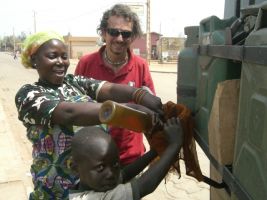
We leave Benin – 24 Feb 2008
We spend our last small change on fuel in Nikki. Petrol stations do not have any diesel, so, we find it on the black market. The carnet for Customs is stamped and the nearby police department stamp our exit. We leave Benin in the afternoon.
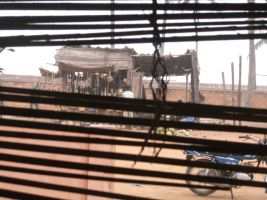
Our Impressions
One the whole the atmosphere is relaxed. People are polite but not very outgoing. There are many roadblocks, although we were never stopped. As in many other French colonies, there are many motorbikes (also used as taxis). We have also seen some Italian “Vespas”.
Through the villages, the main roads are asphalted and well kept.
The best dish is Pate Rouge, a type of polenta with oats and ground peppers. A bit spicy... but very tasty.
